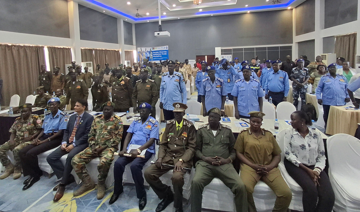The United Nations Development Programme (UNDP), in collaboration with UN Women, the United Nations Mission in South Sudan (UNMISS), Hope Africa South Sudan, and the Government of South Sudan, with support from the UN Peacebuilding Fund, on Thursday convened a gender diversity validation study workshop in Juba to promote a more gender-responsive and inclusive security sector.
The high-level workshop brought together over 120 participants from organized forces, government institutions, and civil society organizations. Discussions centered on advancing gender parity within South Sudan’s security institutions, including the police, prisons, wildlife, and fire brigade services.
In his keynote address, Inspector General of Police Gen. Abraham Manyuat underscored the importance of empowering women in uniform and commended ongoing progress within the South Sudan National Police Service (SSNPS) to promote female officers.
“What I need from our policewomen is to double their efforts and develop confidence in themselves. If you shy away, you will be bypassed, but if you stand on the front line and share your ideas without fear, you will rise like any other officer,” he said. “I urge commanders across the organized forces to create supportive environments for women officers in all security units.”
Gen. Manyuat also highlighted the broader responsibility of law enforcement agencies to set an example for society.
“When I talk about the police, it is the same in the prison, fire brigade, and wildlife. We are the ones implementing the laws of this country, and we must lead by example,” he stated. “I urge all commissioners from different units to return to their states and take care of their female officers.”
For his part, Abdul Arshad, Head of Correction at UNMISS, noted that they have worked alongside UNDP, UN Women, UNESCO, and other partners to design a benchmarking initiative for organized forces to learn from regional experiences in Uganda, Rwanda, and Kenya.
“Although financial constraints have temporarily postponed that initiative, the vision remains intact,” he explained. “These efforts—national-level assessments, institutional gender structures, and planned regional learning—reflect our commitment not just to talk about women’s participation in security, but to build real systems and institutional momentum to make that participation meaningful and sustainable.”
Presenting findings from the Gender Diversity Study and Gender Barrier Assessment, Amuge Barbara Tauga, UN Women’s Project Coordinator for Security Sector Reform, who represented UNDP, revealed that women currently make up only 10 to 15 percent of South Sudan’s security sector workforce, with fewer than 5 percent in senior leadership roles.
“Recruitment and promotion processes remain opaque and often biased against women. Cultural norms discourage women from joining, and while gender policies exist, implementation remains weak,” she stated. “Issues like sexual harassment and gender-based violence are still widespread and underreported.”
The study, Amuge said, represents a landmark report for the national police and prisons services of South Sudan, compiling data and perspectives from officers across the ten states and three administrative areas. It will serve as a baseline for gender mainstreaming and guide future initiatives to strengthen gender equity within the security sector.
Meanwhile, Aduol Aduol Yel, Executive Director of Hope Africa South Sudan, reaffirmed the organization’s commitment to advancing women’s participation in security through the joint project, “Women in South Sudan Security Sector: A Path to Inclusive and Transformative Leadership.”
“This project, supported by the UN Peacebuilding Fund, is being implemented in Upper Nile, Northern Bahr el Ghazal, and Juba,” Aduol said. “Earlier this year, we celebrated Women in Uniform Day on 28 July 2025, highlighting women’s vital roles in peacebuilding and security.”
The workshop concluded with a renewed commitment from all stakeholders to implement the study’s recommendations, strengthen gender-responsive policies, and foster an enabling environment for women’s meaningful participation and leadership in South Sudan’s organized forces.




